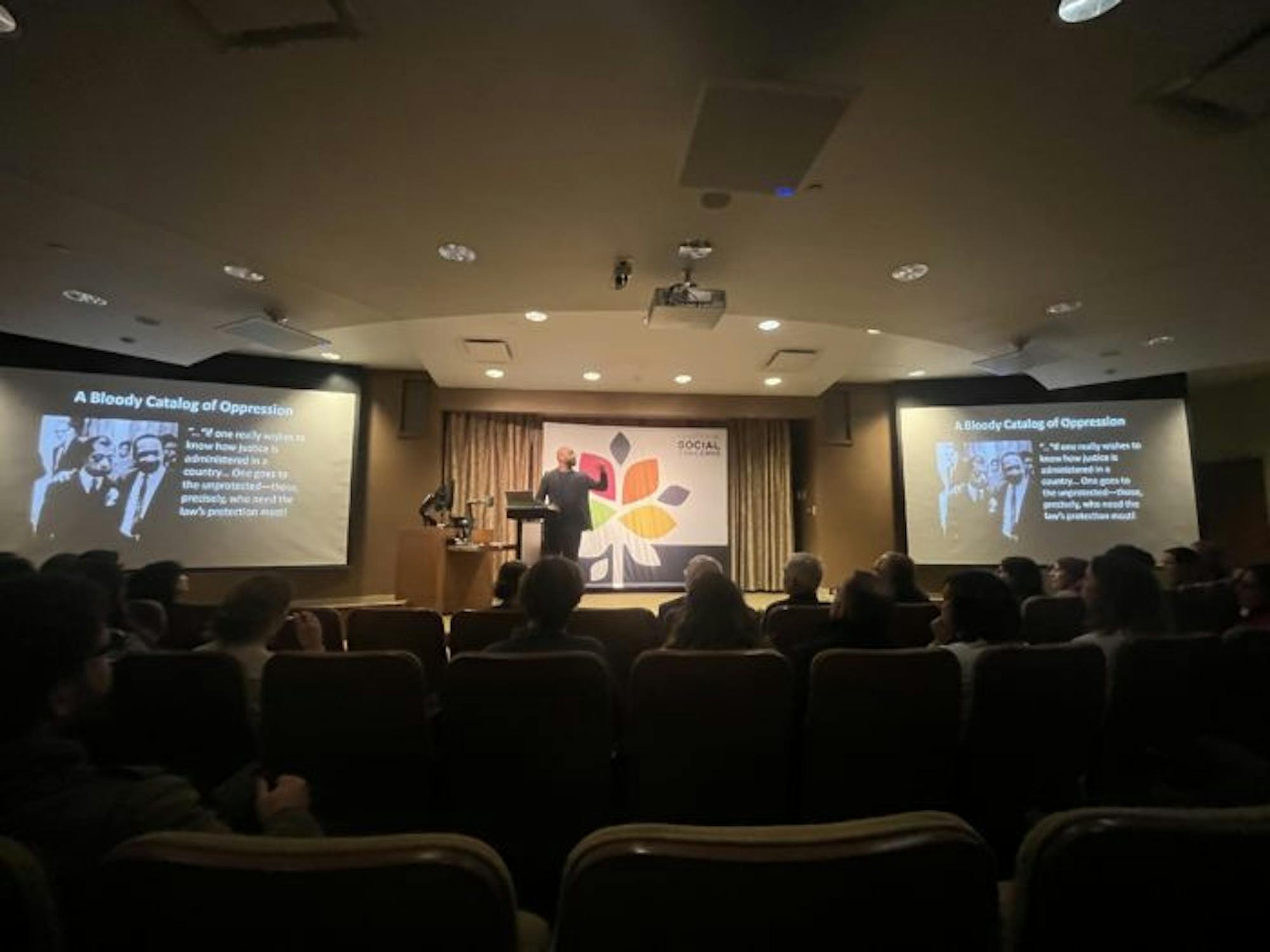
Reuben Jonathan Miller, a MacArthur “Genius Grants” Fellow and University of Chicago sociologist, spoke Friday evening in Geddes Hall about carceral citizenship, a condition of rejection borne by those with criminal records. Miller is the first of four guest speakers in the Center for Social Concerns’ spring lecture series on mass incarceration.
Portraying “mass incarceration’s afterlife” and thinking about what the journey home from the U. S. prison system entails, Miller began the lecture by calling upon his muse: American singer-songwriter and political activist Nina Simone.
For Miller, Simone’s version of the spiritual “Sinnerman” captures the experience of what it means to be rejected because of one’s position within the “social body.” The song considers how being marked by a criminal record and being called a criminal alters a person’s life.
“The sinnerman runs to the rock, to the river, the sea,” Miller said. “The sinnerman runs to the good Lord. The rock says, ‘I won’t hide you.’ The river bleeds. The sea boils. When he gets to God, God says, ‘go to the Devil.’”
Throughout the rest of his time on stage in the Andrews Auditorium, Miller chronicled the lives of three men on their way out the door of the U.S. prison system, reinforcing his arguments about carceral citizenship with statistics concerning criminal justice in the land of the free. To understand how justice is administered in the country, Miller said, it is essential talk to the unprotected.
Miller met a man he referred to as “Jimmy,” who epitomized the sinnerman, on his first day out of prison after serving eight years for grand larceny. Jimmy, who is diagnosed with bipolar disorder, spent his years behind bars without access to treatment. Per his conditions of release, Jimmy was given a set of orders detailing what he must and must not do or risk being sent back to prison.
“So Jimmy’s got to go find a job,” Miller said. “He’s got a report to a place called the Man Workforce Development Center, and I’m going to follow Jimmy. We’re in Detroit and it’s the coldest day of the year. It’s February 2014. Awful. One of those days where you see your own breath.”
Miller’s anecdote continued: Jimmy is underdressed for the walk at the end of the bus line and the workforce development center turns out to be shut down. Miller reluctantly decides to give Jimmy a ride to another center, whose workforce class happens to be at max capacity. Jimmy puts his name on the waiting list and the pair resolve to regroup at a diner and debrief for the day.
“I’ve got sunny side up eggs and some grits with some hair in it,” Miller said. “And here’s Jimmy sitting across from me, thanking me for being there for him. It occurred to me in that moment the position that we put people in.”
Miller explained that without the goodwill of a stranger, Jimmy could have missed his appointment and possibly gone back to jail or prison. He said Jimmy lives in what he considered an economy of favors, having to elicit the services of good-willed strangers for a chance at meeting basic human needs.
“He was rejected by the mental health technician in the prison, he’s rejected when he shows up at that front door [of the workforce development center], I almost reject him because I didn’t trust him,” Miller said. “The world has made no room for Jimmy.”
The post-incarceration journey home for two other ex-convicts, referred to as Zo and Ronald, was just as punishing as the way Jimmy and the sinnerman were made to walk, Miller added.
Miller introduced Zo, a robber of drug dealers from Chicago, a violent felon who can’t get a job. Zo was facing eviction from a “flop house” 30 days after his release from prison. Two days away from homelessness, seeing “two dope boys talking their shit, flashing their little cash,” Zo breaks down, fending off the urge to relapse into his criminal ways.
In the midst of serving 27 years in prison wrongfully accused of shooting a police officer, Ronald’s son was murdered by a 14-year-old boy. Yet Ronald, Miller said, wrote to the judge and the prosecutor, advocating for his son’s murderer to be tried as a juvenile so that he can make a life for himself upon turning 21.
“[Ronald] decided that even people who cause harm deserved a place in the world,” Miller said. “To be fully human is to make mistakes… And that’s our charge to be vulnerable… Our question isn’t whether or not it makes us feel good. The question is, ‘What’s the right thing to do?’”
Figures-wise, Miller drew attention to the growth of the U.S. prison population since 1972, the disproportionate representation of minorities and people with disabilities in the prison system and the revolving door between homelessness and incarceration.
“The jail, the prison is a place where we store the people we’re afraid of,” Miller said. “People we want to throw away, [it is] where we store a surplus population.”
MacArthur ‘Genius’ Fellow kicks off the Center for Social Concerns’ spring series on mass incarceration
Peter Breen
University of Chicago sociologist Reuben Jonathan Miller lectures in Geddes Hall Friday, Feb. 4, 2023. | Peter Breen/The Observer









